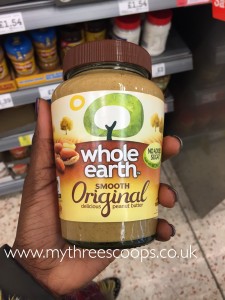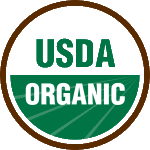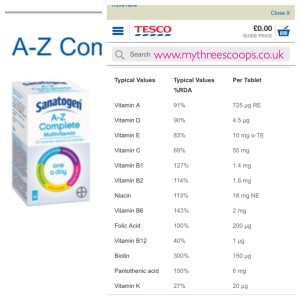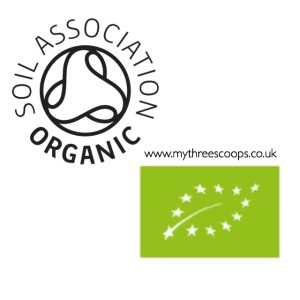**So let me just say, I tried to have a fully vegetarian week last week, and I didn’t even realise when I had been eating chicken! LOL…I think it so funny how my brain doesn’t class chicken as meat…anyway, I’ll try harder next time***
Let’s get to the post –
I’ve been waiting so excitedly to write this post for ages because I LOVE talking about organic food! I’ve probably spent the past 6 months learning about organic food, so I’m sure gonna share a few things that I’ve picked up along the way.
- Organic food is expensive. Let’s quickly get that out of the way lol. It can be as much as double the price of the chemical-ridden alternatives, but for the health benefits, I believe it’s worth it. There are cheaper ways to shop organic though, and I’ll share those tips too.
- Natural DOES NOT mean organic
- Many manufacturers will put labels like “natural”, “all natural”, or “made with real fruit” to try and make you think you are buying an organic product, but they are not the same.

So let’s get stuck into it.
If your food product does not contain one or more of these logos, then it is not organic.

What is the definition of organic? According to the official soil association website, “For foods to be labelled as organic, at least 95% of the ingredients must come from organically produced plants and animals. Any food product sold as ‘organic’ falls under the EU regulations 834/2007 and 889/2008. This means that the product must have been produced to these regulations and inspected and certified by a registered certification body, such as Soil Association Certification“. Here are their rules:
For food –
- artificial chemical fertilisers are prohibited – instead organic farmers develop a healthy, fertile soil by growing and rotating a mixture of crops, adding organic matter such as compost or manure and using clover to fix nitrogen from the atmosphere
- pesticides are severely restricted – instead organic farmers develop nutrient-rich soil to grow strong, healthy crops and encourage wildlife to help control pests and disease
- animal welfare is at the heart of the system and a truly free-range life for farm animals is guaranteed
- a diversity of crops and animals are raised on the farm and rotated around the farm over several seasons, including fallow periods. This mixed farming approach helps break cycles of pests and disease and builds fertility in the soil
- the routine use of drugs, antibiotics and wormers is banned – instead the farmer will use preventative methods, like moving animals to fresh pasture and keeping smaller herd and flock sizes
- genetically modified (GM) crops and ingredients are banned
For animals –
- Must have access to fields (when weather and ground conditions permit) and are truly free range
- Must have plenty of space – which helps to reduce stress and disease
- Must be fed a diet that is as natural as possible and free from genetically modified organisms (GMOs)
- Must only be given drugs to treat an illness – the routine use of antibiotics is prohibited
- Cannot be given hormones which make them grow more quickly or make them more productive
- Must not be produced from cloned animals
Pretty stringent right? Organic products are better for your body and for preserving the earth that God created! My belief is this, the huge increase in health conditions such as diabetes, cancers, early onset puberty, and so many others things are largely due to what is in our food, and as a result what goes into our body. What we must understand is our bodies are natural, and they best process natural things. Anything it does not recognise at natural is either excreted, or if it can not be excreted, our body will store it in our fat cells so it doesn’t harm us and because it doesn’t know how to process it.
This principle is also true for synthetic vitamins; a lot of the lab made vitamins we take are not actually processed by our bodies because they lack the natural carriers and components that our body uses to recognise, and use them. They are stored in our fat cells, and only a tiny percentage of the product is actually absorbed. Why do you think the RDA % of each vitamin in a tablet is usually very close to, or over 100%? Because your body cannot actually absorb it all. <– I’ll write a separate post about this.

The principle is this; what is unnatural, our body fights, excretes, or stores in our fat cells, and increases the quantity of our fat cells to store more junk, and this is why I buy organic wherever possible.
For almost a year, I ate McDonald’s breakfast every day, Monday – Friday; my thought was “how wrong can you go with eggs, sausage, bagel, and cheese?” About a year into this “diet”, I noticed my stomach being more bloated and larger than usual, and I’d always be hungry by about 11am. Within 2 weeks of cutting out the junk and starting my new diet this year, I noticed more muscle definition, and my stomach shrink in size. Why? I’m eating natural and my fat cells are decreasing. I also have a body scanning machine at work which shows your percentage fat, and by changing my diet, my total body fat percentage decreased. I also noticed that my breakfast would last until 12:30pm again, this is because I was eating natural foods with a lower glycaemic index that my body would burn slowly. Again, I will write a separate post about this lol.
Now, by far the easiest, and cheapest way to shop organic is to find your local farmers market. In fact, you will probably find that your local farmers market will be cheaper than your supermarket! A local fruit and veg shop does not mean clean food, and their suppliers could be just the same as the supermarkets. Find your local farmers market, and if they stock organic products, they will have the logo on their website. Also read their ethical policy to see how they choose their suppliers.
If you can’t find a farmers market near you, then most supermarkets now have an organic range in fruit and veg, and dairy products.
In Manchester, Uk, I recommend Unicorn Grocery, and in London, UK, I found this great website Planet Organic who also deliver. Check out their great standards! A simple “farmers market in [insert your city name]” or “organic food market in [insert your city name]” on google will find something close to you. Be sure to check out their website and read their standards
Out of the major English supermarkets, Sainsbury’s by a mile, has the largest range in organic products with everything from organic fruits, vegetables, meat, cereals, snacks, milk, eggs, and anything else you can think of. If you can’t find organic ranges, or it’s out of your price bracket, then buy fruit and veg in season because they’ll be less likely to contain as many chemicals as when they are out of season, and cook as much as you can from scratch – even your bolognese sauce; buy fresh tomatoes blend them, and season with herbs & spices. Check out my first “health” post – Smart Shopping for more details about buying in season.
This really has been a crash course in organic shopping, and I hope it helps and has made sense. If you have any questions, please let me know below and I’ll answer them!
See you next time, and don’t forget to subscribe to my blog. If you like what you’re reading, share it too 🙂


Wow! This article was so helpful! Very informative and inspiring! I can’t wait to see what organic products I find this week at the grocery store. Thanks Fatmohn!! 🙂